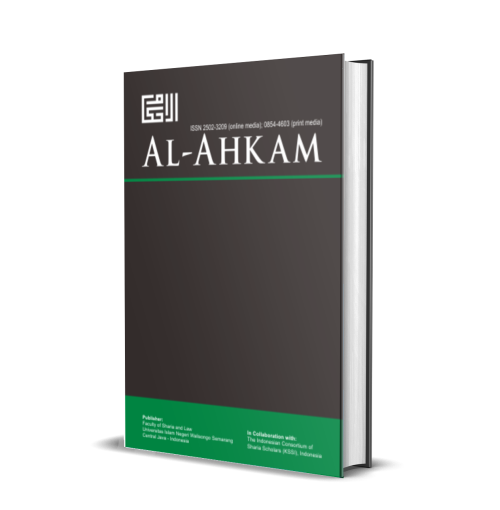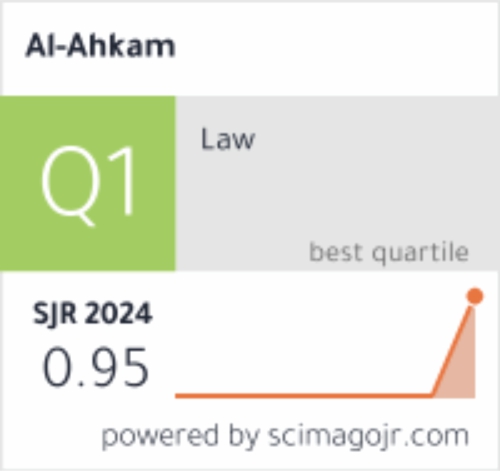An Assessment of Independent Sharī'a Panel (ISP) and Its Roles in Resolving Marital Conflicts in Osun State of Nigeria
DOI:
https://doi.org/10.21580/ahkam.2022.32.2.12598Keywords:
Independent Sharī'a Panel, marital conflict, conflict resolution, ṣulḥAbstract
Every relationship, including marriage, is prone to conflict. There have been many solutions offered in dealing with this problem. The Independent Sharī’a Panel (ISP) in Osun State, Nigeria, is a panel that plays a role in resolving marital conflicts in Osun State. This article aims at describing the family conflict resolution program in Osun State. This article is a result of the study employing both quantitative and qualitative methods. The data gathered were from the field involving the interviews. This article reveals that marital conflict in Osun State is rampant and tends to increase yearly. This study also identified that the Independent Sharī’a Panel has served as a credible alternative mechanism, resulting in the resolution of many marital conflicts in this state. This research recommends that the Independent Sharīʿa Panel initiates a strong orientation program for young people on successful marriages, the consequences of marital discord, and how to resolve the issues.Downloads
References
Adekunle, Titus Kehinde. ‘The Role of Customary Arbitration in the Resolution of Disputes among Nigerian Indigenous Communities’. Journal of Advocacy, Research and Education 4, no. 3 (2015): 175–83. http://www.kadint.net/journals_n/1451479129.pdf.
Adetunji, H. ‘Conflicts and Stress in Marital Life of Literate Married Adults in Kwara State’. University of Ilorin, 2011.
Busari, Jamiu Muhammad. ‘Shari‘a as Customary Law? An Analytical Assessment from the Nigerian Constitution and Judicial Precedents’. Ahkam: Jurnal Ilmu Syariah 21, no. 1 (2021): 25–44. https://doi.org/10.15408/ajis.v21i1.18815.
Haroon, Idris Abdullahi. ‘The Use of Alternative Dispute Resolution (Ṣulḥ) in Sharia Cases’. Wuse, Abuja, 2017. https://nji.gov.ng/images/Workshop_Papers/2017/Area_Sharia_Customary_Judges/s4.pdf.
Harsari, Riski Januar Tri. ‘A Perspective of Husband and Wife Roles in Long-Distance Marriage’. In 5th ASEAN Conference on Psychology, Counselling, and Humanities (ACPCH 2019), 395:268–71. Atlantis Press, 2020. https://doi.org/10.2991/assehr.k.200120.056.
al-Hindī, al-Muttaqī. Kanz al-‘Ummal fī Sunan al-Aqwāl wa al-Af’āl. Beirut: Mawsū’ah al-Risālah, 1985.
Hossain, Md. Shahadat. ‘Arbitration in Islamic Law for the Treatment of Civil and Criminal Cases: An Analytical Overview’. Journal of Philosophy, Culture and Religion 1 (2013): 1–13. https://www.iiste.org/Journals/index.php/jpcr/article/view/9231.
'How Shari'ah Court Is Helping Muslim Faithful Get Justice in Osun'. Daily Trust, February 3 2021. https://dailytrust.com/how-shariah-court-is-helping-muslim-faithful-get-justice-in-osun/.
Igwe, Igwe Onyebuchi, Kevin Onwuka Udude, and Ogah Chinyere Constance. ‘A Review of Continuous Relevance of the Traditional Methods of Dispute Resolution Mechanism in Southeast of Nigeria’. Beijing Law Review 11, no. 1 (2020): 34–42. https://doi.org/10.4236/blr.2020.111003.
Kallek, Cengiz. ‘Socio-Politico-Economic Sovereignty and the Market of Medina’. International Journal of Economics, Management and Accounting 4, no. 1&2 (1996): 1–14. https://journals.iium.edu.my/enmjournal/index.php/enmj/article/view/25.
Kamaldeen, A. ‘The Roles of Imams as Marital Conflicts Mediator in Ilorin Metropolis’. University of Ilorin, 2018.
Kola, Abdul-Fatah Makinde, and Makinde Philip Ostien. ‘The Independent Sharia Panel of Lagos State’. Emory International Law Review 25, no. 2 (2011): 921–44. https://scholarlycommons.law.emory.edu/eilr/vol25/iss2/8.
Lawrence, Elizabeth M., Richard G. Rogers, Anna Zajacova, and Tim Wadsworth. ‘Marital Happiness, Marital Status, Health, and Longevity’. Journal of Happiness Studies 20, no. 5 (2019): 1539–61. https://doi.org/10.1007/S10902-018-0009-9.
Lukito, Ratno. ‘Religious ADR: Mediation in Islamic Family Law Tradition’. Al-Jami’ah 44, no. 2 (2006): 325–46. https://doi.org/10.14421/ajis.2006.442.325-346.
Makinde, Abdul Fatah Kola. ‘The Evolution of the Independent Sharī'a Panel in Osun State, South-West Nigeria’. In Sharī'a in Africa Today, edited by John Chesworth and Franz Kogelmann, 15:71–101. Leiden: Brill, 2014. https://doi.org/10.1163/9789004262126_005.
Malik, Olufadi Lanre Abdul, and Farah Salwani Binti Muda. ‘The Concept of Reconciliation (Ṣulḥ) in Islamic Family Law and Matrimonial Dispute Settlement Practice in Nigeria’. Peak Journal of Social Sciences and Humanities 3, no. 1 (2015): 1–7.
Miao, Chungang. ‘Family Dispute Resolution from the Perspective of Comparative Law’. Asian Social Science 14, no. 8 (2018): 153–57. https://doi.org/10.5539/ass.v14n8p153.
Muhammad, Ramizah Wan. ‘The Theory and Practice of Ṣulḥ (Mediation) in the Malaysian Shariah Courts’. IIUM Law Journal 16, no. 1 (2008): 33–50. https://doi.org/10.31436/iiumlj.v16i1.42.
Odebode, Aminat Adeola. ‘Marital Stress among Working Class Women in Kwara State, Nigeria: Implications for Counselling Practice’. Canadian Journal of Family and Youth / Le Journal Canadien de Famille et de La Jeunesse 11, no. 1 (2019): 20–40. https://doi.org/10.29173/cjfy29410.
Oladosu-Uthman, Habibat. ‘The Contributions of Independent Shari’ah Panel (ISP) in Curbing Incidences of Divorce (Talāq) Practices among Muslims in Ibadan, Southwestern Nigeria’. Ibadan Journal of Humanistic Studies 30, no. 1 (2021): 156–73. https://www.ajol.info/index.php/ibjhs/article/view/208974.
Olorunoje, H.M. ‘An Appraisal of Ṣulḥ (Reconciliation) in Resolving Marital Dispute among Muslims in Ilorin South Local Government Area, Kwara State, Nigeria’. University of Ilorin, 2017.
Othman, Aida. ‘“And Amicable Settlement Is Best”: Ṣulḥ and Dispute Resolution in Islamic Law’. Arab Law Quarterly 21, no. 1 (2007): 64–90. https://www.jstor.org/stable/27650573.
Scheeren, Patrícia, Rebeca Veras De Andrade Vieira, Viviane Ribeiro Goulart, and Adriana Wagner. ‘Marital Quality and Attachment: The Mediator Role of Conflict Resolution Styles’. Paidéia (Ribeirão Preto) 24, no. 58 (1 May 2014): 177–86. https://doi.org/10.1590/1982-43272458201405.
Serrano, D. ‘Bringing Arbitration (Tahkim) and Conciliation (Sulh) Under the Qadi’s Purview in Maliki al-Andalus (10th to 12th Centuries C.E.’ Revue Des Mondes Musulmans et de La Mediterranee, 2016. https://doi.org/10.4000/remmm.9623.
Shah, Sayed Sikander. ‘Mediation in Marital Discord in Islamic Law: Legislative Foundation and Contemporary Application’. Arab Law Quarterly 23, no. 3 (2009): 329–46. https://www.jstor.org/stable/40604748.
'Shari'ah Court Handles 383 Cases in Osun'. Universal Reporters, June 29 2022. https://universalreportersng.com/shariah-court-handles-383-cases-in-osun/.
Storer, Heather L., Maria Rodriguez, and Roxanne Franklin. ‘“Leaving Was a Process, Not an Event”: The Lived Experience of Dating and Domestic Violence in 140 Characters’. Journal of Interpersonal Violence 36, no. 11–12 (2021): NP6553–80. https://doi.org/10.1177/0886260518816325/format/epub.
Tasew, Abelneh Shemaye, and Koye Kassa Getahun. ‘Marital Conflict among Couples: The Case of Durbete Town, Amhara Region, Ethiopia’. Cogent Psychology 8, no. 1 (2021): 1–17. https://doi.org/10.1080/23311908.2021.1903127.
Tolorunleke, Caroline Aduke. ‘Causes of Marital Conflicts amongst Couples in Nigeria: Implication for Counselling Psychologists’. Procedia-Social and Behavioral Sciences 140 (2014): 21–26. https://doi.org/10.1016/j.sbspro.2014.04.381.
Zahraa, Mahdi, and Nora A. Hak. ‘Taḥkīm (Arbitration) in Islamic Law within the Context of Family Disputes’. Arab Law Quarterly 20, no. 1 (2006): 2–42. https://www.jstor.org/stable/27650536.
Downloads
Published
How to Cite
Issue
Section
License
By submitting an article to the journal, the author(s) agree to transfer the published article's copyright to the journal, which will act as the publisher. This means the journal will have the right to publish the article in various forms, including reprints. The journal will maintain the publishing rights to the published articles.
In line with the license, authors and third parties (readers, researchers, and others) are allowed to share and adapt the material. In addition, the material must be given appropriate credit, provided with a link to the license, and indicated if changes were made. If authors remix, transform or build upon the material, authors must distribute their contributions under the same license as the original.



